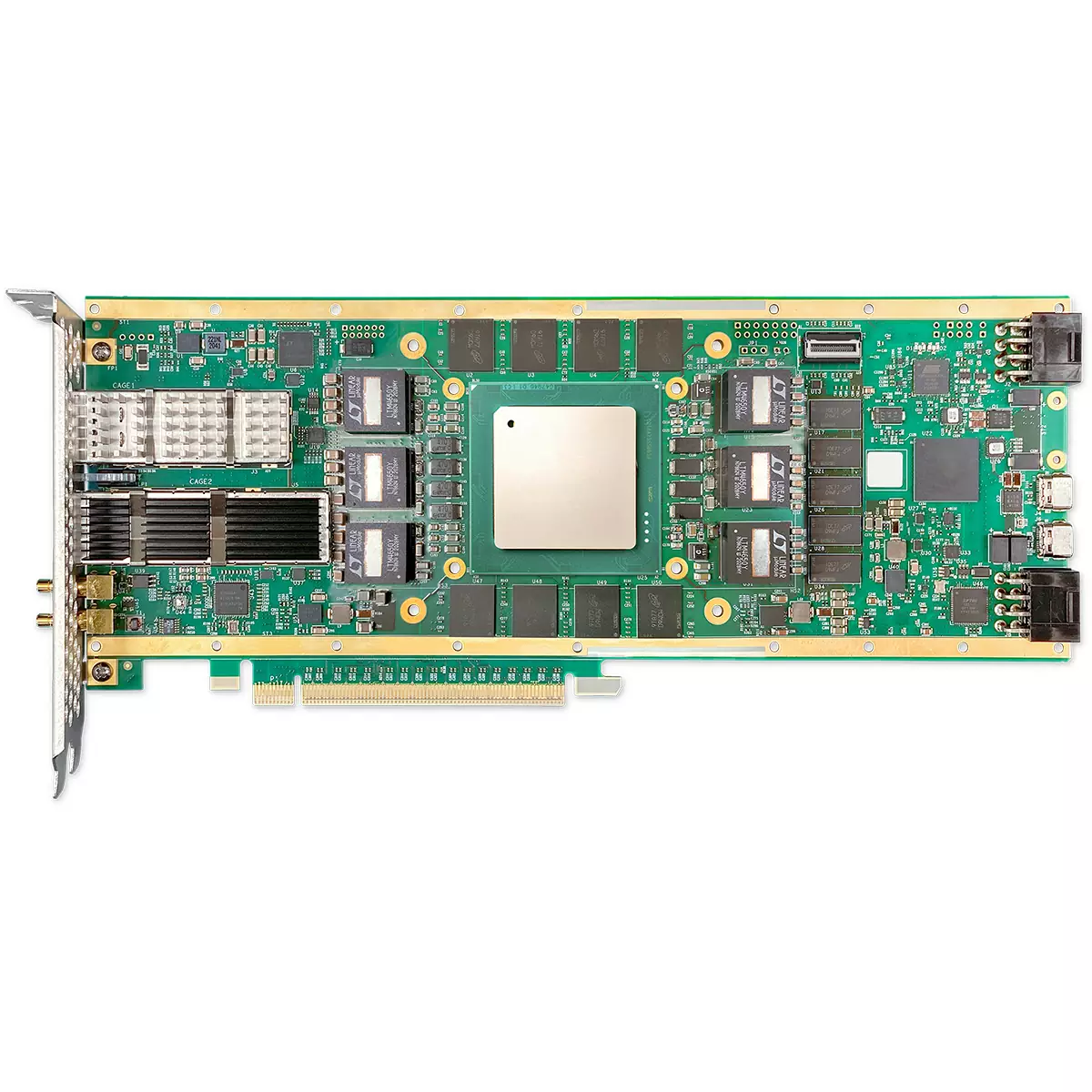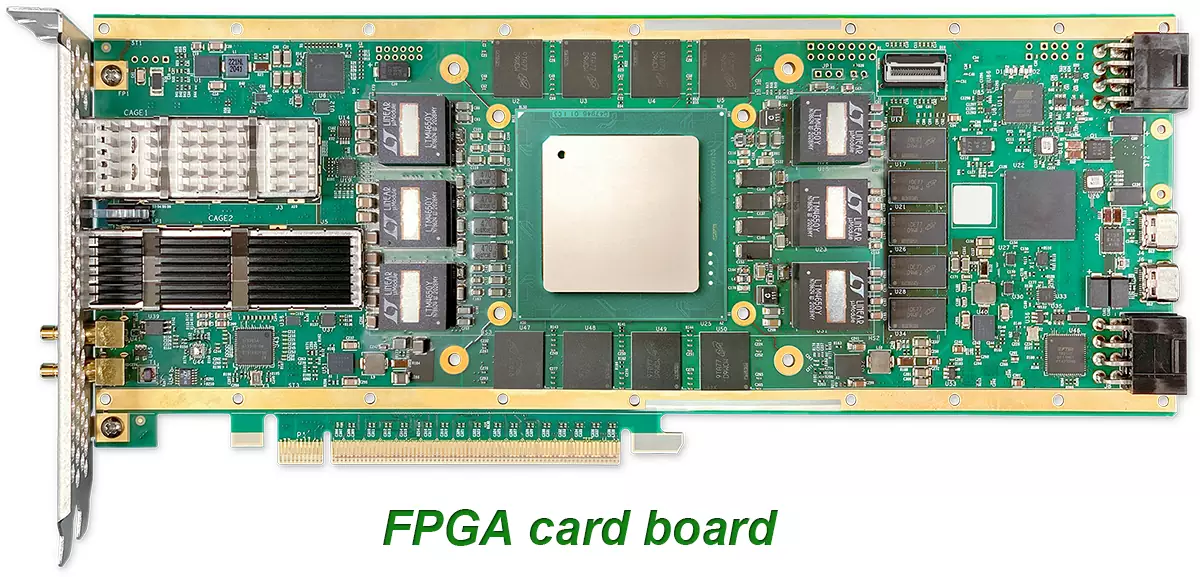
Product Name: FPGA card board
PCB layers: 28 layers
Surface technology: ENIG+gold-plated 20U
Green solder mask
PCB testing: Yes
PCB manufacturing: Yes
Features: Multilayer high-speed PCB
iPCB provides component purchasing services
RoHS compliant lead-free assembly
Application: FPGA computing card
FPGA computing card is widely used for computing acceleration in fields such as image recognition and processing, video encoding and decoding, compression and decompression, speech recognition and processing, neural networks, machine learning, and network security. Supports the sending and receiving of Ethernet interface messages, and can perform specified acceleration processing on the sent and received messages according to the different algorithm types loaded by the customer. The completed data is then sent to the designated destination.
FPGA card is gradually establishing their position as a powerful alternative to GPUs in the fields of artificial intelligence and high-performance computing. The core advantage of FPGA lies in its excellent programmability. FPGA computing cards have the ability to modify internal circuits, making them the preferred tool for prototyping and development.
Engineers can rely on FPGA to achieve rapid iteration, test different hardware configurations until they find the best solution to a specific problem. FPGAs typically outperform GPUs in terms of latency and power consumption, especially when finely tuned for specific tasks.
Developers can customize hardware accelerators for specific tasks that may not be compatible with the fixed architecture of GPUs. This feature gives FPGA a high degree of flexibility, allowing it to fine tune hardware design to maximize efficiency. In terms of graphics processing, it should be pointed out that high-performance dedicated GPUs still have better performance and power consumption.
FPGA provides a solution for hardware acceleration and real-time processing specific applications that require high customization and energy efficiency. With the rapid development of artificial intelligence technology, the programmability advantage of FPGA is gradually becoming prominent, especially in artificial intelligence inference scenarios that require frequent adjustment of underlying models. With the widespread application of artificial intelligence in the field of electronics, the application scope of FPGA will be further expanded.
Comparison of Characteristics between FPGA Computing Card and GPU in the AI Field
1. Performance and power consumption comparison: In the field of AI, the performance and power consumption of FPGA and GPU are key indicators for measuring cost-effectiveness. FPGA may provide higher cost-effectiveness in specific scenarios, such as LLM inference tasks.
2. Flexibility and Customization: Another significant advantage of FPGA is its flexibility and customization. Compared to GPUs, FPGAs can be optimized at the hardware level for specific algorithms, thereby reducing unnecessary computational and storage overhead.
3. Market positioning and application scenarios: The market positioning of FPGA in the AI field mainly focuses on application scenarios with strict requirements for real-time processing and low latency. Significant improvements have been achieved in AI performance, making it particularly suitable for AI applications in data centers, networks, and embedded markets.
4. Cost benefit analysis: Although the initial investment cost of FPGA may be higher than GPU, its energy efficiency and programmability in long-term operation may bring higher total cost of ownership (TCO) advantages. Especially in the era of LLM where algorithms are constantly iterating and optimizing, the flexibility of FPGA can reduce hardware replacement costs caused by technological obsolescence.
GPUs are mainly good at floating-point, parallel, and fixed-point, and can provide a large number of HBMs. FPGAs are better at real-time processing, with low latency and flexible adaptability. They have very rich memory architecture resources, just like Lego bricks, which can be customized for splicing and assembly.
In terms of performance, FPGA and GPU each have their own advantages. FPGAs demonstrate higher performance in certain specific tasks due to their parallel processing capabilities and customizable hardware logic. For real-time AI applications that require rapid response, FPGA can provide lower latency. GPU performs well in handling large-scale parallel tasks, especially during the deep learning training phase. FPGAs can outperform GPUs in performing certain AI algorithms, such as convolutional neural network (CNN) inference.
The initial purchase cost of FPGA is usually higher than GPU, but FPGA has higher energy efficiency and may have lower long-term operating costs. The programmability of FPGAs means that they can adapt to new algorithms and models, reducing the upgrade costs caused by technological iterations.
Different AI application scenarios have varying hardware requirements. FPGA is more suitable for applications that are delay sensitive and require fast response, such as autonomous driving, real-time speech recognition, etc. GPUs are more suitable for scenarios that require processing large amounts of data and performing complex calculations, such as large-scale image and video processing.
In the future, with the continuous advancement of technology and the continuous expansion of the market, FPGA has the potential to achieve technological integration in certain specific application scenarios to meet increasingly complex computing needs. With the continuous emergence of new computing technologies such as photon computing and quantum computing, the AI hardware market is facing unprecedented opportunities for innovation and development.
FPGA technology will showcase its unique advantages in different application scenarios, jointly promoting the sustained prosperity of the AI hardware market.

Product Name: FPGA card board
PCB layers: 28 layers
Surface technology: ENIG+gold-plated 20U
Green solder mask
PCB testing: Yes
PCB manufacturing: Yes
Features: Multilayer high-speed PCB
iPCB provides component purchasing services
RoHS compliant lead-free assembly
Application: FPGA computing card
iPCB Circuit provides support for PCB design, PCB technology, and PCBA assembly. You can request technical consultation or quotation for PCB and PCBA here, please contact email: sales@ipcb.com
We will respond very quickly.